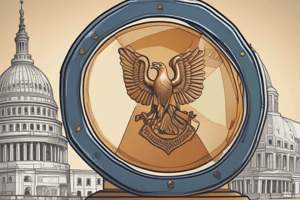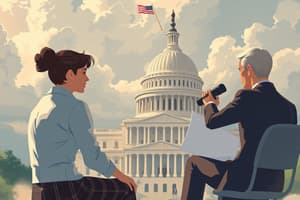Podcast
Questions and Answers
Which of these is considered a benefit of lobbying? (Select all that apply)
Which of these is considered a benefit of lobbying? (Select all that apply)
- Lobbying creates an advantage in government for wealthier citizens and corporations.
- Lobbying ensures that lawmakers are well funded for the next election.
- Lobbying facilitates communication between the public and lawmakers. (correct)
- Lobbying reduces opportunities for corruption in government because it reduces the role of money.
Lobbyists are required to follow strict:
Lobbyists are required to follow strict:
- Restrictions on free speech.
- Legal and ethical standards. (correct)
- State voting laws.
- Tax regulations on income.
A lobbyist's job includes:
A lobbyist's job includes:
- Researching and understanding issues being considered by lawmakers. (correct)
- Practicing law and defending clients in court.
- Making political connections and giving gifts to lawmakers in exchange for support.
- Registering with the government and getting a specialized license.
If super political action committees (PACs) cannot donate directly to political campaigns, how do they best support the campaigns?
If super political action committees (PACs) cannot donate directly to political campaigns, how do they best support the campaigns?
How does lobbying benefit the government?
How does lobbying benefit the government?
This amendment guarantees citizens the right to:
This amendment guarantees citizens the right to:
How does lobbying negatively affect government?
How does lobbying negatively affect government?
What is the main purpose of an interest group?
What is the main purpose of an interest group?
Which best describes what economic interest groups generally support?
Which best describes what economic interest groups generally support?
Do lobbyists exert influence among all three branches of government? Why or why not?
Do lobbyists exert influence among all three branches of government? Why or why not?
Flashcards are hidden until you start studying
Study Notes
Lobbying and Its Impact
- Lobbying facilitates communication between the public and lawmakers, ensuring that diverse opinions are represented in government.
- Legal and ethical standards are mandatory for lobbyists, governing their conduct and operations.
- A primary duty of lobbyists is to research and understand issues that lawmakers are considering, ensuring informed discussions.
Political Action Committees (PACs)
- Super PACs support political campaigns by running independent campaigns rather than donating directly to candidates.
- PACs can influence political landscapes through advertising and independent efforts that align with specific candidates.
Benefits of Lobbying
- Lobbying assists in educating and informing lawmakers about various issues, streamlining their decision-making processes.
- It simplifies the decision-making process by presenting information to lawmakers, although it may not represent all interests equally.
First Amendment Rights
- The First Amendment guarantees citizens the right to influence their representatives' decisions, which encompasses the act of lobbying.
Negative Aspects of Lobbying
- Lobbying can create opportunities for corruption, as it allows for outside influence on government decisions.
- It may also lead to biased information overload, affecting lawmakers’ perceptions and decisions.
Interest Groups
- The main purpose of interest groups is to influence government policy, aiming to shape legislation to their advantage.
- Economic interest groups typically support business interests, advocating for policies that benefit their constituents.
Influence Across Government Branches
- Lobbyists exert influence across all three branches of government, offering advice on legislation and submitting briefs in court cases to shape legal outcomes.
Studying That Suits You
Use AI to generate personalized quizzes and flashcards to suit your learning preferences.




